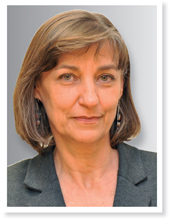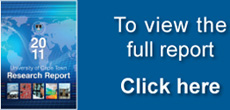Research Office
 The work of the Research Office is primarily geared towards enabling optimal research activity and excellence. This is achieved through a service-oriented approach and the implementation of internationally benchmarked systems, structures and procedures. Its wide range of activities include running research development programmes, accrediting and evaluating the university’s research groupings, facilitating its engagement with global rankings, tracking its publication count, building proposals, forging new and strategic partnerships, and expanding access to grants.
The work of the Research Office is primarily geared towards enabling optimal research activity and excellence. This is achieved through a service-oriented approach and the implementation of internationally benchmarked systems, structures and procedures. Its wide range of activities include running research development programmes, accrediting and evaluating the university’s research groupings, facilitating its engagement with global rankings, tracking its publication count, building proposals, forging new and strategic partnerships, and expanding access to grants.
In pursuit of its first priority to support the development of scholars, the Research Office runs two key programmes that form the core of research capacity development at UCT: the Emerging Researcher Programme (ERP), for new researchers, and the Programme for the Enhancement of Research Capacity (PERC), for mid-career researchers. Both are pioneering programmes. Through their research development grants, their workshops on a variety of topics crucial to the development of an academic career (such as supervision training, producing competitive grant applications, and writing for publication) and through their one-on-one advice sessions, the ERP and PERC provide a nurturing space within which researchers can reach their full potential.
Participation in the ERP has continued to rise steadily since the programme’s inception in 2003, and in 2011, it had 492 registered participants.
PER C, now in its third year, also continues to gain ground. In addition to developing capacity at UCT, it is playing a key role in raising UCT’s global visibility through one of its sub-projects, the African Research Project on Knowledge Production. This project encourages collaborative, cross-disciplinary research that interrogates and disrupts dominant, Eurocentric knowledge paradigms, and is mindful of UCT’s location and roots in Africa and the university’s Afropolitan vision. A Carnegie grant made possible the awarding of R1,8 million in funding over a three-year period. Twelve grants of R150,000 each have been awarded. In addition, two further grants funded by the Vice-Chancellor’s Strategic Fund were awarded in 2011. The work of PERC and ERP is also complemented by the Mellon Visiting and Retired Scholars Mentorship Project, which is aimed at giving further individualised support to young academics through structured mentoring organised within selected host departments that apply for such support through a competitive process.
In addition, the Research Office supports academics in meeting the needs of the university’s postgraduate students. It co-ordinates a supervision training programme that is open to all academic staff, whether they are supervising postgraduate students for the first time or are seasoned academics who wish to update and strengthen their supervision skills.
UCT is not only well-placed, but also committed to playing a part in ensuring that South Africa and the rest of Africa can count on a vibrant academic profession in the future. Creating the Next Generation of Academics, a programme implemented in 2011, is an initiative aimed at assisting a select group to attain a PhD and then enter academia. It is aimed at the revival of the academy in Africa generally, but also at the strengthening of UCT’s own staff complement (through a Carnegie grant, in co-operation with three other African universities: the University of the Witwatersrand (South Africa), Ghana-Legon (Ghana) and Makerere (Uganda)). It is concentrated in the areas of civil engineering, economics, and infectious diseases. This programme, implemented in 2011, features PhD training hubs and its own mentoring programme and is progressing very well, with 45 participants earmarked for future roles in academic life.
The Research Office’s support for participation in international research opportunities also gained ground in 2011, notably through an initiative funded by the National Institutes of Health (NIH), aimed at strengthening grant management skills. This intervention has already enabled an increase from 11 to 16 NIH awards during the current reporting period.
In addition, the NIH has awarded the Research Office a supplementary grant to provide training in international grants management to colleagues in higher education institutions in Southern Africa. The partner institutions have been identified by the NIH and include Moi University in Kenya, the University of Zambia, Lusaka and Mbarara University in Uganda. This provides an excellent opportunity to strengthen UCT’s links with institutions on the African continent.
In order to meet the eResearch needs of academics at UCT, the Research Office is working closely with UCT’s Information and Communication Technology Services to develop a sophisticated Research Portal, or e-Research site. This will provide a one-stop shop giving researchers access to research information, as well as tools and resources that are available within UCT.
In summary, we continued to consolidate and advance the work of the Research Office in the past year. Efficient support from our side requires inclusivity and consultation with researchers and we greatly value the spirit of mutual collaboration that continues to shape this partnership. We are pleased to see our efforts translate into excellent research performance across the university and we expect to build on this in the year ahead.

In pursuit of its first priority to support the development of scholars, the Research Office runs two key programmes that form the core of research capacity development at UCT: the Emerging Researcher Programme (ERP), for new researchers, and the Programme for the Enhancement of Research Capacity (PERC), for mid-career researchers. Both are pioneering programmes. Through their research development grants, their workshops on a variety of topics crucial to the development of an academic career (such as supervision training, producing competitive grant applications, and writing for publication) and through their one-on-one advice sessions, the ERP and PERC provide a nurturing space within which researchers can reach their full potential.
Participation in the ERP has continued to rise steadily since the programme’s inception in 2003, and in 2011, it had 492 registered participants.
PER C, now in its third year, also continues to gain ground. In addition to developing capacity at UCT, it is playing a key role in raising UCT’s global visibility through one of its sub-projects, the African Research Project on Knowledge Production. This project encourages collaborative, cross-disciplinary research that interrogates and disrupts dominant, Eurocentric knowledge paradigms, and is mindful of UCT’s location and roots in Africa and the university’s Afropolitan vision. A Carnegie grant made possible the awarding of R1,8 million in funding over a three-year period. Twelve grants of R150,000 each have been awarded. In addition, two further grants funded by the Vice-Chancellor’s Strategic Fund were awarded in 2011. The work of PERC and ERP is also complemented by the Mellon Visiting and Retired Scholars Mentorship Project, which is aimed at giving further individualised support to young academics through structured mentoring organised within selected host departments that apply for such support through a competitive process.
In addition, the Research Office supports academics in meeting the needs of the university’s postgraduate students. It co-ordinates a supervision training programme that is open to all academic staff, whether they are supervising postgraduate students for the first time or are seasoned academics who wish to update and strengthen their supervision skills.
UCT is not only well-placed, but also committed to playing a part in ensuring that South Africa and the rest of Africa can count on a vibrant academic profession in the future. Creating the Next Generation of Academics, a programme implemented in 2011, is an initiative aimed at assisting a select group to attain a PhD and then enter academia. It is aimed at the revival of the academy in Africa generally, but also at the strengthening of UCT’s own staff complement (through a Carnegie grant, in co-operation with three other African universities: the University of the Witwatersrand (South Africa), Ghana-Legon (Ghana) and Makerere (Uganda)). It is concentrated in the areas of civil engineering, economics, and infectious diseases. This programme, implemented in 2011, features PhD training hubs and its own mentoring programme and is progressing very well, with 45 participants earmarked for future roles in academic life.
The Research Office’s support for participation in international research opportunities also gained ground in 2011, notably through an initiative funded by the National Institutes of Health (NIH), aimed at strengthening grant management skills. This intervention has already enabled an increase from 11 to 16 NIH awards during the current reporting period.
In addition, the NIH has awarded the Research Office a supplementary grant to provide training in international grants management to colleagues in higher education institutions in Southern Africa. The partner institutions have been identified by the NIH and include Moi University in Kenya, the University of Zambia, Lusaka and Mbarara University in Uganda. This provides an excellent opportunity to strengthen UCT’s links with institutions on the African continent.
In order to meet the eResearch needs of academics at UCT, the Research Office is working closely with UCT’s Information and Communication Technology Services to develop a sophisticated Research Portal, or e-Research site. This will provide a one-stop shop giving researchers access to research information, as well as tools and resources that are available within UCT.
In summary, we continued to consolidate and advance the work of the Research Office in the past year. Efficient support from our side requires inclusivity and consultation with researchers and we greatly value the spirit of mutual collaboration that continues to shape this partnership. We are pleased to see our efforts translate into excellent research performance across the university and we expect to build on this in the year ahead.


